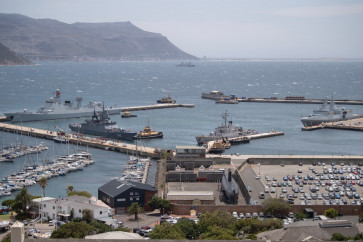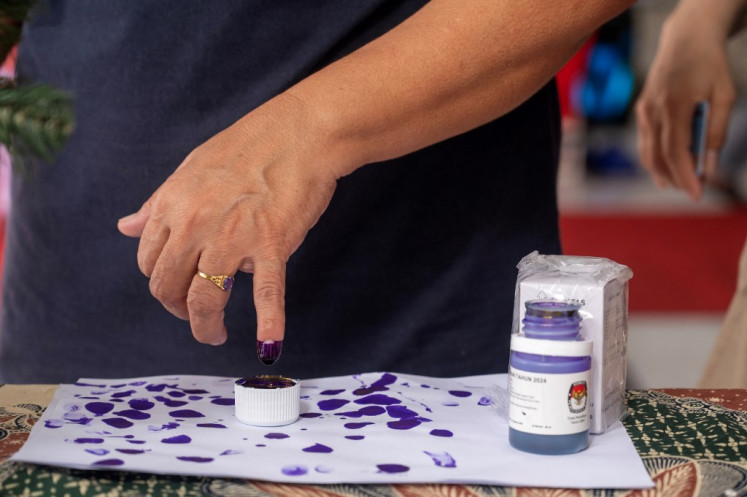Popular Reads
Top Results
Can't find what you're looking for?
View all search resultsPopular Reads
Top Results
Can't find what you're looking for?
View all search resultsRewriting the story of 1965
Shared history: Historian Harry A
Change text size
Gift Premium Articles
to Anyone
 Shared history: Historian Harry A. Poeze talks in a session to discuss his book, Tan Malaka, Gerakan Kiri dan Revolusi Indonesia (Tan Malaka, the Leftist Movement and Indonesian Revolution), in Semarang, Central Java. (JP/Suherdjoko)" border="0" height="400" width="600">Shared history: Historian Harry A. Poeze talks in a session to discuss his book, Tan Malaka, Gerakan Kiri dan Revolusi Indonesia (Tan Malaka, the Leftist Movement and Indonesian Revolution), in Semarang, Central Java. (JP/Suherdjoko)
Shared history: Historian Harry A. Poeze talks in a session to discuss his book, Tan Malaka, Gerakan Kiri dan Revolusi Indonesia (Tan Malaka, the Leftist Movement and Indonesian Revolution), in Semarang, Central Java. (JP/Suherdjoko)" border="0" height="400" width="600">Shared history: Historian Harry A. Poeze talks in a session to discuss his book, Tan Malaka, Gerakan Kiri dan Revolusi Indonesia (Tan Malaka, the Leftist Movement and Indonesian Revolution), in Semarang, Central Java. (JP/Suherdjoko)When the New Order regime fell in 1998, with it came down walls concealing vast amounts of information on a dark chapter of Indonesiaâs past.
It shone more light on the systematic persecution of alleged members of the Indonesian Communist Party (PKI), which took place after the 1965 abortive coup that was blamed on the PKI.
Researcher Wijaya Herlambang said there was a great thirst for information about what happened in 1965.
âThe younger generation has often been labeled as a generation with great political apathy, but they are actually really curious about what happened. With the rise of the Internet, they now hear varied â often conflicting â information about events from the left and right. They distrust the New Orderâs version of events and want to know the truth, devouring any new piece of information they receive,â Wijaya told The Jakarta Post.
In his book, Kekerasan Budaya Pasca 1965: Bagaimana Orde Baru Melegitimasi Anti-Komunisme Melalui Sastra dan Film (Post-1965 Cultural Violence: How the New Order Legitimized Anti-communism Through Literature and Film), Wijaya said the regime implemented a prolonged political campaign, which was culturally aggressive, to legitimize violence against communists and their supporters during and after 1965.
âThe regime justified its violence through films, museums, dioramas, monuments, commemoration days, course material, school books, history books and literature,â he said.
According to Wijaya, among the primary evidence of this was The Treachery of G30S/PKI film, shown every Sept. 30th during the New Order era, which branded army generals as âmartyrsâ and the communists as âtorturersâ. Elementary school history books told similar stories with a toned-down description of the murders.
âThis work emphasized that the communists were torturers and therefore deserved to be murdered. Leftist ideas were banned. After 1966, Indonesia did not have any tradition of leftist literature,â Wijaya said, referring to Peopleâs Consultative Assembly (MPRS) Decree No. 25/1966 on the dissolution of the PKI and the ban on Marxism and communism.
span class="caption" style="width: 598px;">Shared history: Historian Harry A. Poeze talks in a session to discuss his book, Tan Malaka, Gerakan Kiri dan Revolusi Indonesia (Tan Malaka, the Leftist Movement and Indonesian Revolution), in Semarang, Central Java. (JP/Suherdjoko) When the New Order regime fell in 1998, with it came down walls concealing vast amounts of information on a dark chapter of Indonesia's past. Gaining knowledge: A collection of non-fiction works about Indonesian history. (JP)
S
It shone more light on the systematic persecution of alleged members of the Indonesian Communist Party (PKI), which took place after the 1965 abortive coup that was blamed on the PKI.
Researcher Wijaya Herlambang said there was a great thirst for information about what happened in 1965.
'The younger generation has often been labeled as a generation with great political apathy, but they are actually really curious about what happened. With the rise of the Internet, they now hear varied ' often conflicting ' information about events from the left and right. They distrust the New Order's version of events and want to know the truth, devouring any new piece of information they receive,' Wijaya told The Jakarta Post.
In his book, Kekerasan Budaya Pasca 1965: Bagaimana Orde Baru Melegitimasi Anti-Komunisme Melalui Sastra dan Film (Post-1965 Cultural Violence: How the New Order Legitimized Anti-communism Through Literature and Film), Wijaya said the regime implemented a prolonged political campaign, which was culturally aggressive, to legitimize violence against communists and their supporters during and after 1965.
'The regime justified its violence through films, museums, dioramas, monuments, commemoration days, course material, school books, history books and literature,' he said.
According to Wijaya, among the primary evidence of this was The Treachery of G30S/PKI film, shown every Sept. 30th during the New Order era, which branded army generals as 'martyrs' and the communists as 'torturers'. Elementary school history books told similar stories with a toned-down description of the murders.
'This work emphasized that the communists were torturers and therefore deserved to be murdered. Leftist ideas were banned. After 1966, Indonesia did not have any tradition of leftist literature,' Wijaya said, referring to People's Consultative Assembly (MPRS) Decree No. 25/1966 on the dissolution of the PKI and the ban on Marxism and communism.
The researcher said the cultural violence carried out by the New Order regime through the years was as brutal as the violence of the 1965 purge.
As well as spreading a particular narrative on the 1965 tragedy, the New Order also banned several works of non-fiction that had a different take on what happened in this period.
One of them was Terror of the New Order Regime ' Law Misappropriation & Propanganda 1965-1981 by Julie Southwood and Patrick Flanagan, which offered evidence and analysis that there was a coup by the military in 1965 and a structured attempt to place the blame on the PKI.
The book was released in London in 1983 but failed to enter Indonesia as it was banned by the Soeharto regime. It finally entered Indonesia last year, translated as Teror Orde Baru ' Penyelewengan Hukum & Propaganda 1965-1981.
The information blockade slowly started to fade in the 1990s, with academics developing their knowledge on the events and things improved after the fall of Soeharto in 1998.
'After the Internet, there was an information explosion. More and more works of literature were available, so the shroud of history could begin to be lifted,' said Wijaya.
In 2004, the Constitutional Court revoked the ban for ex-PKI members to run in legislative elections in the 2003 General Elections Law, another point of progress in reestablishing civil rights of PKI members and their families ' mostly condemned without trials or investigations.
Asvi Warman Adam, a historian at the Indonesian Institute of Sciences (LIPI), said separately that one of the most interesting elements of the 1965 events in recent literature was that they were being recounted by the younger generation.
'I've read a number of works of literature written by the third generation of 1965 victims. It's interesting to see how this generation is responding to what happened to their grandparents,' Asvi said.
Correcting the history, the historian said, could be done not only through scientific publications and victim testimony, but also through fiction novels.
'Fiction novels are more effective efforts to correct the history, because they are more widely read,' Asvi said.
The historian said the Indonesian media had done all it could to keep such efforts alive, but anti-communism in Indonesia still prevailed, as did the ban on the PKI and on communism.
'Anti-communism will remain as long as the Indonesian Army remains [unchanged], because rewriting the history will reveal gross violations of human rights that were committed by the soldiers,' Asvi said.
Wijaya said he was optimistic that the official history of the events of 1965 would be rewritten as long as the movement to reveal the truth was kept alive.
'There are strong political and military interests that are blocking this effort, but it can be done slowly. The New Order took dozens of years to bury the truth, to plant its propaganda and to legitimize the violence. We will need a similarly long period of time to change this.
'Intellectuals, artists, everyone ' we all need to keep doing this together,' he said.
Your Opinion Matters
Share your experiences, suggestions, and any issues you've encountered on The Jakarta Post. We're here to listen.
Thank You
Thank you for sharing your thoughts. We appreciate your feedback.
Share options
Quickly share this news with your network—keep everyone informed with just a single click!
Gift Premium Articles
to Anyone
Share the best of The Jakarta Post with friends, family, or colleagues. As a subscriber, you can gift 3 to 5 articles each month that anyone can read—no subscription needed!
Continue in the app
Get the best experience—faster access, exclusive features, and a seamless way to stay updated.









